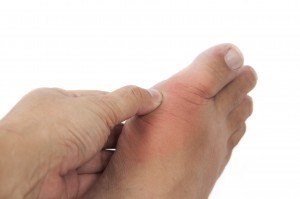Latest Results on Krystexxa, Gout Clinical Study
 Patients with more severe forms of gout have not had much luck with the available treatments, but it looks like one drug may be able to help reduce their symptoms. According to a recent gout clinical study, this drug being has shown potential for being able to help the more extreme cases of gout. This new clinical research was funded by Savient, the pharmaceutical company which already markets the drug, known as Krystexxa (pegloticase).
Patients with more severe forms of gout have not had much luck with the available treatments, but it looks like one drug may be able to help reduce their symptoms. According to a recent gout clinical study, this drug being has shown potential for being able to help the more extreme cases of gout. This new clinical research was funded by Savient, the pharmaceutical company which already markets the drug, known as Krystexxa (pegloticase).
Given the results of this gout clinical trial, researchers have reported that patients who were administered the drug showed fewer gout symptoms than those that had received a placebo (these results came in only a few months after starting the treatment). A majority of gout patients have a more mild form of the disease, and researchers have advised that they do not take the drug. This gout drug still has some reported side effects and should not be necessary for most patients.
Of the almost 6 million Americans living with gout, only three percent do not see any benefit from taking the common medications which are available for this disease (common types include Zyloprim and Lopurin). For some gout patients, there may be another underlying reason which prevents them from taking these medications.
Krystexxa, which is administered every other week by injection, was approved by the FDA last year. The drug was approved for use by people who had been diagnosed with gout. In essence, Krystexxa works by breaking down the built up uric acid into a substance that the patient’s body can more easily pass.
With the current report, data has been combined from two separate clinical trials involving 212 chronic gout patients. The primary group was administered the injection every two weeks for six months and then compared to a group that received an injection once a month and a group that was administered a placebo during the six months. Most of the patients in this study were middle aged men.
The uric acid levels quickly dropped in the patients that had received Krystexxa, but this response was not always sustained. About forty-two percent of the primary group and 35 percent of the monthly injection group maintained these lowered uric acids after six months.
 The average patient who had received the drug had a more significant improvement in physical function and overall quality of life when compared to the participants who had been administered the placebo. Researchers also noted that the participants who had received the most injections also reported the lowest amount of pain through the study.
The average patient who had received the drug had a more significant improvement in physical function and overall quality of life when compared to the participants who had been administered the placebo. Researchers also noted that the participants who had received the most injections also reported the lowest amount of pain through the study.
However, the results of the clinical trial showed that an overwhelming majority of the patients reported at least one side effect during the six months (including reactions to the injections, headaches, nausea, some cases of breathing complications, and painful gout flare-ups). The results confirmed that these adverse reactions were more common among the participants who had been administered Krystexxa.
There were also seven reported deaths during this gout clinical trial: one random placebo assigned patient who died before the treatments began, three patients assigned to Krystexxa who died during the treatment period, and another three (one on Krystexxa and two on placebos) that passed away after the treatments had ended. The report showed that two deaths during the treatment period involved cardiovascular complications (an arrhythmia and cardiac arrest), and one was the result from renal failure. However, there were no cardiovascular problems seen in the patients who had been given placebos.
One other drawback to this gout drug is that it costs $5,000 per month. Doctors have suggested that patients who see an improvement in their gout symptoms should consider going back to a cheaper medication. Unfortunately, researchers are still not sure how long most patients would require injections before they could make the switch. If anything, these results have shown that there are still some questions to be answered in regards to the use of Krystexxa.